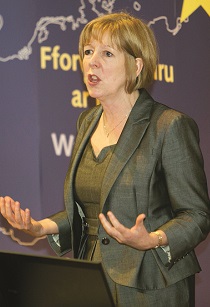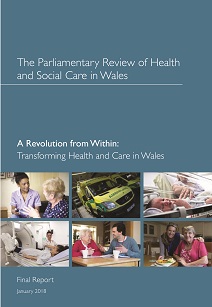Completing the picture
For several years, many NHS organisations have been keen on value-based healthcare – improving quality and efficiency hand in hand – but to date its implementation in the UK has been limited to individual providers or local health economies. But, if Wales follows the recommendations of the recent Parliamentary review of health and social care, it could soon be seen across a national system.
The review team’s final report, A revolution from within: transforming health and care in Wales, sets out a vision for the future shape of services and recommends steps to achieve that vision. There should be a seamless system of health and social care, with services based around individuals, and provided as close to home as possible, it says.
Set up by the Welsh government and chaired by Ruth Hussey (pictured), the former Wales chief medical officer, the review panel also included US value guru Don Berwick and respected healthcare researchers and commentators. It says a new value-based approach to maintaining and improving the quality of health and care is needed.
The need for change is being driven by a number of well-known factors – workforce shortages, outcomes that are not improving as quickly as desired, and variation in the quality of services. In the meantime, spending is outpacing economic growth.

Dr Hussey says shifting a greater proportion of Welsh government spending to health and care could impact adversely on other areas of public spending, such as education, housing and the arts, that can influence health and wellbeing. This made the need to maximise value achieved in care more pressing.
‘The scale of the challenge ahead should not be underestimated,’ she says. ‘It is clear change is needed and even clearer that this should happen quickly. We have detected an appetite for change and a desire to get on with it. A strong commitment to transform not just how much is done, but what and how it is delivered, is needed. We hope this report will be a catalyst for the action needed, and help to guide the future of health and social care in Wales.’
When the report was published in January, health secretary Vaughan Gething said a new government long-term plan for health and social care, due in the spring, will take account of the report’s recommendations.
Essentially, there are two parts to the report – a strategic element sets out a vision for change to an integrated, patient-centred service that delivers care closer to home, uses technology to improve access to and delivery of care and seeks to continuously improve quality. The second element looks at how change can be achieved, mainly through stronger management using tools such as realigned financial incentives, benchmarking of outcomes and costs and revised GP contracts.
Quadruple aim
The vision for the future is underpinned by delivering the quadruple aim – an expanded version of the triple aim developed in the United States. The quadruple aim includes four mutually supportive goals that seek to:
- Improve population health and wellbeing through a focus on prevention
- Improve the experience and quality of care
- Increase the value achieved from the finances available, through improvement, innovation, use of best practice and elimination of waste
- Increase the wellbeing, capability and engagement of health and social care staff – the extra component added to the triple aim.
The report insists that every plan, strategy and practice should be driven by the quadruple aim. This could lead to radical changes. For example, to achieve the first aim, the Welsh government and health boards would have to redistribute funding to support prevention
Benchmarking would play a key role in driving the better value and reduced waste element of the quadruple aim. Identifying meaningful measures, especially in workforce productivity, would be critical. Wales could even adapt work being carried out in England, such as the Carter review, Getting it right first time and the new Care Quality Commission use of resources assessment.
It adds that extending the work based on the International Consortium for Health Outcomes Measurements (ICHOM) programme – ICHOM has been working with Aneurin Bevan University Health Board – could provide the focus for the value element of the quadruple aim. ICHOM aims to drive value by measuring patient outcomes and costs and believes that if care is restructured around outcomes, with financial incentives for better outcomes, health systems can improve quality and curb inefficiencies.
The underlying financial system should be strengthened and support the costing of care pathways. These costs could be combined with clinical outcomes data to assess value.
The report says a wider approach to implementing the quadruple aim and new models of care could also include changes in financial rules. New, more creative incentives could be introduced, covering revenue, capital and transformation funding, such as pay for performance and pay for quality, including productivity.
New models of care could be accelerated through integrated capital funding and simpler rules on access to funds, especially where the new models run across organisational boundaries.
Better use of metrics would be needed to support the domains of the quadruple aim, while performance and outcomes should be regularly benchmarked across Wales, the UK and internationally. Patients should be given the ability to choose between NHS providers and there should be investment to improve quality and system learning. Contracts for GPs and community pharmacists should be revised to boost community service provision.
Wales is already moving in the direction described in the report, with its policies of integrating health and social care and prudent healthcare. But broad strategies have not always translated into actionable priorities, it says – to achieve the progress outlined in the report, more central action will be needed.
‘Faster progress will require at least, as the Organisation for Economic Co-operation and Development (OECD) put it, a “stronger central guiding hand” to play a more prescriptive role,’ it says. Traditional targets and performance management were too narrow and produced limited results – but progress could be made with stronger management, at local health board level particularly, and new ways of measuring progress. The latter could include new national support, incentives, benchmarking, accountability, regulation and transparency.
The review panel believes the central NHS Wales national executive must be strengthened to achieve these changes in funding flows, regulation and performance analysis. Currently, it does not have enough capacity. To comply with the OECD’s view that there should be a stronger guiding hand at the centre, ‘national assets’ such as specialised services, commissioning and the NHS Wales Informatics Service should not be held at health board or trust level.
And to give the service headroom to progress with transformation, as a minimum NHS Wales should set an efficiency target that allows it to break even and implement new ways of working, the report says. These targets should be backed by clear metrics, benchmarked at health board level. ‘Improving quality and reducing waste is really important – the day job really matters to people, so doing that well and getting value from it will help achieve efficiency savings,’ it says.
Government response
Responding to the report, health secretary Vaughan Gething said: ‘I’m pleased that the report suggests what we are already doing in Wales with regard to the integration of health social care services is right. But we will need to carefully consider the findings of this review to see how this can be improved in the future.
‘The new long-term plan for health and social care will be published in the spring, taking account of recommendations in this report. I believe that what we have seen from the panel will set firm foundations for the future of health and social care in Wales for many years to come.’
The response to the report from within health and social care has been largely positive. British Medical Association Welsh Council chair David Bailey says national management must be strengthened. ‘BMA Cymru Wales welcomes the report, and many of the recommendations, particularly the recognition that the national executive function in NHS Wales needs to be strengthened; that technology and infrastructure developments must be accelerated; and that medical engagement must be a priority.’
Vanessa Young, director of the Welsh NHS Confederation, says the report is a major contribution to the debate on how to create a sustainable health and care system in Wales. ‘Our members agree that a different system of care is needed, one that’s seamless across health and social care, physical and mental health, and secondary and primary community care.
‘The report recognises we have been moving towards a more integrated system for a number of years and there are many good examples of new models of care that are already working in Wales. The challenge is how we can be more radical and ambitious, to accelerate the pace in moving to a genuinely seamless system.’
Value-based care will be important, she adds. ‘We agree with the panel that it’s crucial for us to increase the value we achieve from the funding of health and care.
‘It is also helpful the panel recognises that the level and sources of funding for health and social care remain key national issues. As we develop plans to transform the health and care system, we must ensure they are supported by sustainable funding.’
Pressure groups highlight the fact that the level of funding was not in the review’s remit, with one group describing it as the elephant in the room.
Huw David, Welsh Local Government Association health and social care spokesperson, says: ‘One immediate challenge is the need for appropriate levels of funding and a long-term funding model to support the health and social care system outlined in the report. The reality is that without adequate funding and new investment for health and social care in the future, the changes outlined in the report will not be enough to ensure a sustainable health and care system. Bold leadership is required at all levels.’
Funding will remain an issue, but as the report says, whatever the overall funding level the current and future demand for health and social care means every pound must be spent effectively – and that is why it recommends a nationwide value-based approach.
A&E approach
Although the review’s remit did not include commenting on the level and sources of funding for health and social care, it did acknowledge these are major issues. Indeed, shortly after its report was published, A&E consultants in Wales wrote to first minister Carwyn Jones warning that safety in their departments was compromised and this was due to under-funding of health and social care.
Signed by almost 50 consultants from the six health boards in Wales, it followed a similar letter to UK prime minister Theresa May from emergency department doctors in England. The Welsh letter said that A&Es did not have enough staff or beds, while performance against the four-hour standard was similar to some of the worst performers in England. Welsh departments were overcrowded; patients could be waiting for days to be admitted to a ward; makeshift arrangements were needed to accommodate surplus patients; and ambulances often had to queue up outside.
There was evidence that overcrowding adversely affects patients’ morbidity and mortality in line with the amount of time they spend in overcrowded emergency departments, they added.
While the doctors acknowledged that NHS Wales and health boards had put enormous effort into planning for the winter, those plans had fallen short of what was needed to deliver adequate care for patients.
The letter continued: ‘We appreciate the financial constraints under which the Welsh government must operate. However, we feel that the current situation demonstrates that both the Welsh NHS and Welsh social care are severely and chronically under-resourced. We have neither sufficient staff, nor sufficient beds (in either acute hospitals or the community) to cope with the needs of our ageing population.’
The consultants called for an increase in social care funding, a review of the number of acute care beds, a workforce strategy to improve recruitment and retention and the abolition of the four-hour A&E standard.
EPR funding call
The NHS in Wales and the Welsh government face tough decisions on funding and priorities if the electronic patient record (EPR) is to be implemented in a reasonable timeframe, according to the Wales Audit Office.
In a report on informatics, the WAO said better information systems led to better outcomes for patients.
NHS Wales had a clear vision for the installation of a series of local EPRs that can communicate with each other. However, despite this goal of a national system going back more than a decade, no funding had been agreed and there was no implementation plan. There had been disagreement about the flexibility to develop local systems and the delivery of a national system, but the NHS was clarifying these areas, the auditors said.
The WAO estimated that spending on information and communications technology was less than 2% of NHS Wales funding – significantly less than recommended by Sir Derek Wanless in his 2003 review of health and social care in Wales.
In 2016, the health service estimated it would need £484m on top of existing budgets to implement the EPR vision over a five-year period. The WAO said the Welsh government had acknowledged that this estimate should be tested and the underpinning assumptions made should be confirmed.
Auditor general Huw Vaughan-Thomas (pictured) said: ‘We know better access to information leads to better outcomes for patients and fewer mistakes by clinicians. Putting the vision of an electronic patient record into practice means all parts of NHS Wales, including Welsh government, need to take some tough decisions, particularly on funding, priorities and enabling clinicians to have the time and space to lead on this agenda. Unless it addresses the issues identified in my report, the NHS risks further frustration among frontline staff and ending up with systems already outdated by the time they are completed.’
Related content
We are excited to bring you a fun packed Eastern Branch Conference in 2025 over three days.
This event is for those that will benefit from an overview of costing in the NHS or those new to costing and will cover why we cost and the processes.